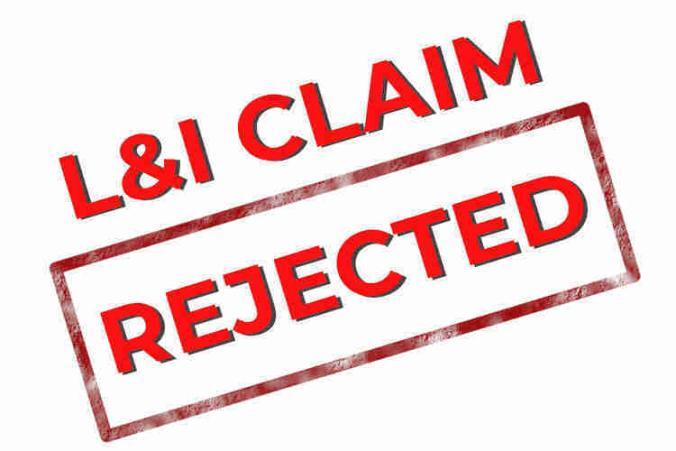Washington State has 2 types of workers’ compensation claims. One is a work injury claim. The other is an occupational disease claim. In this article, we’ll cover why L&I denied your L&I claim for a work injury claim. Next week, I will post another article about why L&I rejects occupational disease claims. And remember, if L&I rejected your claim, you should call an L&I attorney.
What are the requirements to file an L&I claim?
The Industrial Insurance Act governs all workers’ compensation claims in Washington State. Under the law, an industrial injury (see RCW 51.08.100) is something sudden and tangible. It’s an event that produces an immediate result. More simply, it’s when you suffer a work accident that results in an actual injury.
Washington State is biased towards workers. Yes, the law favors L&I claim approvals. You can file an L&I claim even for a minor workplace injury. Most likely, L&I will allow it. In fact, the Department of Labor and Industries (L&I) will allow a claim if you satisfy 2 requirements:
- There must be a sudden tangible traumatic event. We call this event the “accident”; and
- It must cause an immediate physical condition. The law calls this “bodily harm”.
Why did they deny my claim?
The requirements to file an L&I claim are very simple. Therefore, it can be very confusing when L&I rejects your claim. Some common reasons why L&I can deny your claim are below.
L&I denied my claim because the work accident didn’t happen
Sometimes, L&I gets information that the accident didn’t happen. Or that it didn’t happen at work. Information like this can come from employers, coworkers, or witnesses. If L&I thinks there’s credible evidence, then L&I will probably reject your claim. On occasion, L&I can question how the accident happened. For example, if they think it’s not as you describe it in the Report of Accident. In such cases, L&I may investigate and try to understand what really went on.
Therefore, you must always write down what happened. Use your own words. Do it as soon as you can. Describe to yourself everything in detail. Also, be sure to include the date, day, and time of accident. Write the location of the accident and who saw it. If there’s a video of the incident, then ask for a copy right away. Take phone numbers and email addresses for witnesses. Finally, if anyone says the accident didn’t happen (at all or at work) – ask witnesses to write what they saw.
L&I rejected my claim because I filed late
You have 1 year to file an L&I claim. That’s 1 year from the date of the accident. It seems like a lot. However, do not wait to file your claim. You should file as soon as possible. The longer you wait, the more likely it is that L&I rejects your claim. That’s because L&I will question the validity of your claim. Moreover, if you don’t file an L&I claim within 1 year, then L&I rejects your claim automatically. If L&I rejected your claim because of the 1-year limit – there’s (almost) nothing you can do about it.
L&I claim denied for lack of medical support
Not every workplace accident results in an industrial injury. To approve an L&I claim, there must be bodily harm. You have to show cause and effect. For example, falling off a ladder is a cause. A broken arm is an effect. Here, a medical professional must establish the connection between the accident and the body harm. In other words, a doctor must say your accident caused a medical condition that needs treatment. Alternatively, it can be a chiropractor, nurse practitioner, psychologist, or others medical professionals.
If there’s no supportive medical opinion – don’t be surprised if L&I rejects your claim. Therefore, make sure your provider fills the Physicians Initial Report completely. This form is part of the package they submit to L&I when filing your claim. Explain to your doctor exactly what happened. Make sure they understand how the accident caused the bodily harm.
L&I claim rejected because of incomplete report of accident
After a work injury, you must go to a medical provider. There, the medical office files your claim. To file, they fill the Report of Accident form. You must fill certain parts of the form. Other sections are the responsibility of the medical office. The form must be complete. Also, when sending the form to L&I, it must include the initial medical visit report.
L&I rejects claims if they don’t receive all the necessary paperwork. Hence, it’s important to fill your portion. Moreover, it’s absolutely fine to ask your provider if they filled their part. In general, issues with the Report of Accident are rare. On top, they are easy to fix.
Summary and conclusion
There are many reasons why L&I rejects or denies L&I claims. The purpose of this article is to provide some common reasons (and how to avoid them). There are other reasons too. However, please keep in mind the following takeaway. If you had an injury at work that needs medical attention – file a claim right away. If L&I rejects your claim, you have 60 days to appeal L&I’s decision. In those 60 days you need to figure out why L&I denied your claim. Put together evidence to show why L&I must approve your claim. Then, advocate for L&I to change the decision. If any of these things seems confusing or difficult – contact a workers’ compensation attorney for help right away.


